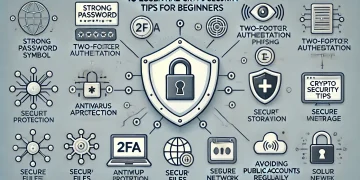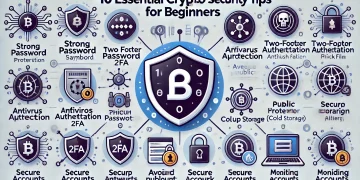In today’s rapidly evolving digital landscape, cryptocurrencies like Bitcoin, Ethereum, and countless others are reshaping the global economy. These digital assets offer incredible opportunities, but they also present significant risks. With the increasing value of cryptocurrencies, they have become a prime target for hackers, scammers, and cybercriminals. Therefore, safeguarding your digital assets is crucial.
In this comprehensive guide, we will explore the key strategies, tools, and best practices for ensuring your cryptocurrency investments remain safe. We’ll cover everything from choosing secure wallets to recognizing scams and implementing strong security measures.
1. Understanding the Importance of Crypto Security
Cryptocurrencies are decentralized, meaning they operate independently of traditional financial systems and institutions. While this brings numerous advantages such as anonymity, lower fees, and independence from centralized control, it also comes with unique risks. In the world of crypto, if you lose your assets, there’s no bank or authority that can retrieve them for you. Therefore, the responsibility of securing your digital assets falls entirely on your shoulders.
Understanding why crypto security is important is the first step in protecting yourself. In 2023 alone, billions of dollars were lost due to crypto scams, hacks, and security breaches. As the market grows, these threats will only increase. Thus, it is essential to treat your digital assets with the same seriousness as you would any other valuable possession.
2. Choosing the Right Crypto Wallet
One of the most critical aspects of cryptocurrency security is choosing the right wallet. A wallet stores your private keys—unique cryptographic signatures that prove ownership of your assets. Without these private keys, you cannot access or manage your crypto.
Types of Crypto Wallets:
- Hot Wallets: These are digital wallets connected to the internet. While they are convenient for regular transactions, they are more vulnerable to hacks.
- Cold Wallets: These wallets are offline and are much safer as they are not exposed to potential online threats. Examples include hardware wallets and paper wallets.
Popular Wallets:
- Hardware Wallets (Cold Storage): Ledger Nano S, Trezor Model T
- Software Wallets (Hot Storage): Exodus, MetaMask, Trust Wallet
Tips for Choosing a Wallet:
- Always opt for wallets with a proven track record and strong community support.
- Ensure the wallet offers robust encryption and multi-signature support.
- For long-term storage, cold wallets are the safest choice.
3. Enabling Two-Factor Authentication (2FA)
Two-factor authentication (2FA) adds an extra layer of security to your crypto accounts. By enabling 2FA, even if your password is compromised, a hacker would still need access to the second form of authentication, such as a code sent to your phone, to log in.
How to Implement 2FA:
- Use apps like Google Authenticator or Authy for generating time-sensitive codes.
- Avoid SMS-based 2FA as it can be vulnerable to SIM-swapping attacks.
- Make sure to back up your 2FA codes in case you lose access to your device.
2FA can be the difference between a failed hacking attempt and a devastating loss of assets.
4. Secure Your Private Keys
Your private keys are the most critical piece of information in the crypto ecosystem. They grant full control over your funds. If someone else gains access to your private keys, they can drain your wallet in minutes, and there’s no way to recover the lost funds.
Best Practices for Private Key Security:
- Never share your private keys: No legitimate service will ask for your private keys.
- Store them offline: If possible, keep your private keys in a cold storage wallet or use a hardware wallet.
- Use multi-signature wallets: These require multiple private keys to authorize a transaction, adding an extra layer of security.
- Backup your private keys: Write them down and store them in a secure physical location. Avoid keeping them in digital format, such as in a document or cloud storage.
5. Beware of Phishing Attacks
Phishing is one of the most common tactics used by hackers to steal private information, including cryptocurrency login details and private keys. In a phishing attack, scammers typically pose as legitimate companies or individuals to trick users into revealing sensitive information.
How to Avoid Phishing Attacks:
- Verify URLs: Always double-check the website’s URL before entering sensitive information. Phishing sites often have URLs that closely resemble legitimate sites.
- Don’t click on links from unsolicited emails or messages: Scammers often use emails, texts, and social media to lure victims into phishing traps.
- Enable anti-phishing tools: Many crypto wallets and exchanges offer built-in anti-phishing protection. Enable these features if available.
6. Avoid Public Wi-Fi for Crypto Transactions
Public Wi-Fi networks are notoriously insecure and can be easily exploited by cybercriminals. If you access your crypto wallets or make transactions over a public Wi-Fi network, you expose yourself to the risk of man-in-the-middle attacks, where hackers intercept and alter communication between you and the web service.
Tips for Safe Browsing:
- Avoid accessing crypto wallets or making transactions on public networks.
- If you must use public Wi-Fi, consider using a virtual private network (VPN) to encrypt your connection.
- For added security, use a dedicated device for crypto transactions that isn’t used for other activities like browsing or social media.
7. Keeping Your Software Up-to-Date
Outdated software is one of the most common vulnerabilities exploited by hackers. Regular updates often include critical security patches that protect against new threats.
How to Stay Secure:
- Update your wallet software: Regularly update your wallet and any related applications to the latest versions to ensure they have the most recent security fixes.
- Enable automatic updates: If available, enable automatic updates to ensure you don’t miss critical patches.
- Update your operating system and antivirus software: Keep your device’s operating system and antivirus software up to date as well.
8. Understanding and Avoiding Common Scams
The cryptocurrency space is rife with scams targeting both new and experienced users. Understanding the most common types of scams can help you avoid falling victim to them.
Common Crypto Scams:
- Ponzi Schemes: These scams promise high returns with little or no risk but rely on new investor money to pay earlier investors. Eventually, they collapse when there aren’t enough new investors.
- Fake Exchanges: Some scam platforms pose as legitimate exchanges to steal funds or personal information.
- Pump and Dump Schemes: Scammers artificially inflate the price of a cryptocurrency through false statements, only to sell off their holdings once the price peaks, leaving others with losses.
- Giveaway Scams: Fake giveaways, especially on social media, often promise free crypto if you first send a smaller amount. Legitimate giveaways never ask for you to send crypto first.
How to Avoid Scams:
- Always research thoroughly before investing or engaging with any service.
- Be skeptical of offers that seem too good to be true.
- Stick to reputable exchanges and wallet services.
9. Backup Your Wallet Regularly
Backing up your crypto wallet ensures that if your device is lost, damaged, or stolen, you can still recover your assets. Wallets typically allow you to back up your private keys or create a seed phrase that can be used to restore your funds.
Best Practices for Wallet Backups:
- Use a strong password: Ensure your wallet is encrypted with a strong password.
- Store backups securely: Keep your backup in multiple secure locations, such as a safe or secure digital storage.
- Test your backup: Periodically test your backup to ensure it can restore your wallet if needed.
10. Utilizing Multi-Signature Wallets
Multi-signature (multi-sig) wallets are an excellent way to add extra security to your digital assets. With a multi-sig wallet, multiple private keys are required to authorize a transaction, making it much harder for hackers to gain full control.
Benefits of Multi-Signature Wallets:
- Enhanced security: Even if one key is compromised, additional keys are needed to complete transactions.
- Joint control: Multi-sig wallets are ideal for businesses or joint ventures, as they require consensus among several parties to execute transactions.
- Recovery options: If one key is lost, the wallet can still be accessed using the remaining keys.
11. Secure Your Mobile Device
Many people use mobile wallets or manage their crypto portfolios on smartphones. While convenient, this practice can be risky if your phone is compromised.
Steps to Protect Your Mobile Device:
- Set a strong passcode or biometric lock: Use facial recognition or a strong PIN to lock your device.
- Enable remote wipe features: In case your phone is lost or stolen, remote wipe capabilities allow you to erase all data.
- Avoid downloading untrusted apps: Only install apps from reputable sources like the official app stores.
12. Insurance for Digital Assets
As the crypto market matures, insurance options for digital assets are becoming more common. Some exchanges and custodians now offer insurance policies that cover theft, hacking, and even personal mistakes.
How to Get Crypto Insurance:
- Research whether your exchange or wallet provider offers insurance.
- Consider third-party insurance providers that specialize in cryptocurrency.
While insurance won’t prevent theft, it can help recover some or all of your lost assets if the worst happens.
13. Recognizing Social Engineering Attacks
Social engineering attacks exploit human psychology to trick users into divulging sensitive information or making mistakes. In the context of crypto, social engineering can involve impersonating trusted figures, companies, or even friends to gain access to your accounts.
Common Social Engineering Techniques:
- Impersonation: Scammers pose as legitimate support staff or service providers.
- Urgency: Creating a false sense of urgency to force users into making quick, uninformed decisions.
- Authority: Pretending to be a figure of authority, such as law enforcement, to intimidate victims.
To avoid falling for these tricks, always verify the identity of anyone requesting sensitive information and be cautious when dealing with strangers online.
14. Keeping a Low Profile
In the crypto world, it’s often wise to keep a low profile. Publicly announcing your investments or discussing large holdings can make you a target for hackers and scammers.
Tips for Staying Under the Radar:
- Avoid sharing details about your crypto holdings on social media or public forums.
- Use pseudonyms or anonymous profiles when discussing crypto online.
- Be cautious of whom you share your crypto activity with, even in private.
15. Educating Yourself Continually
The crypto world is constantly evolving, and so are the threats. Staying informed about the latest security developments and trends is critical for long-term asset protection.
Resources for Ongoing Education:
- Subscribe to security newsletters from reputable crypto websites.
- Follow industry experts on social media.
- Participate in online forums and discussions to stay updated on potential risks and best practices.
Conclusion: Stay Vigilant and Proactive
Protecting your digital assets requires constant vigilance and a proactive approach. By following the best practices outlined in this guide—such as using secure wallets, enabling two-factor authentication, and educating yourself on common scams—you can significantly reduce your risk of losing your cryptocurrency.
Remember, in the decentralized world of crypto, you are your own bank. This gives you unprecedented control, but it also places the responsibility of security squarely on your shoulders. Stay informed, stay cautious, and always prioritize the safety of your digital assets.






























